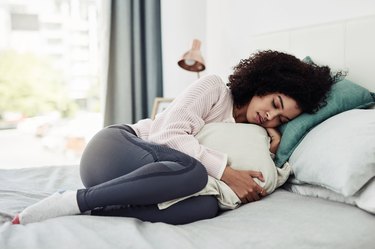
If your stomach is churning or cramping and your lower back is aching, it's important to know that the causes for lower back and lower stomach pain can range widely. Depending on your pain level, you may benefit from ringing your doctor's office to figure out what's causing it and get relief.
Read more: How Backache and Gastric Problems May Be Linked
Video of the Day
Video of the Day
Causes: Lower Back and Lower Stomach Pain
Many conditions can be behind lower back and lower stomach pain. In fact, it's possible for pain to stem from a problem within the reproductive, musculoskeletal, urinary or digestive system, according to the Mayo Clinic.
For instance, menstrual cramps are a common cause of abdominal pain as well as lower back pain, according to the U.S. National Library of Medicine.
Endometriosis, a condition that occurs when uterine-like tissue grows in areas outside the uterus, is another condition that can cause stomach and back pain at the same time in women, according to the Office on Women's Health.
"There are many known chronic overlapping pain conditions with endometriosis, notably abdominal pain and low back pain," Heather Jeffcoat, DPT, a doctor of physical therapy at Femina Physical Therapy in Southern California, says. "Endometriosis is known for creating cyclic and noncyclic pain in the abdomen, low back and jaw."
Gastrointestinal conditions could be at the root of lower abdominal and potentially lower back pain as well.
Irritable bowel syndrome (IBS), a gastrointestinal disorder, could lead to pain in the lower stomach and possibly the lower back, according to Kaliq Chang, MD, a board-certified interventional pain management specialist at Atlantic Spine Center in New Jersey and New York. In addition to abdominal pain, common symptoms of IBS include gas, bloating, cramps and diarrhea, the Mayo Clinic says.
Read more: What Is IBS, Exactly?
The Mayo Clinic also says that, in extreme cases, diverticulitis can cause lower abdominal pain, usually on the left side. This condition occurs when small pouches, which have formed along the digestive tract lining, become inflamed and/or infected. More common symptoms of diverticulitis include persistent pain, fever, nausea, vomiting, tenderness in the abdominal area and constipation.
Appendicitis is another extreme cause of abdominal pain and potentially lower back pain, Dr. Chang says. When a blockage occurs inside the appendix, causing appendicitis, symptoms can include abdominal swelling, constipation, diarrhea and low fever, among other symptoms, according to the U.S. National Library of Medicine.
Getting Stomach and Back Pain Relief
If your lower abdominal pain and lower back pain are mild, you may benefit from taking an over-the-counter pain reliever and monitoring how you feel for a couple of days, Dr. Chang says. "However, if it's a severe pain or if there's fever, vomiting, dizziness or any other moderate-to-severe symptom, either call the doctor or go to urgent care or the emergency room," he says.
In cases when you're experiencing both lower abdominal and lower back pain, determining any abdominal causes would take priority, Dr. Chang says. "From the perspective of a spine specialist, if there's lower abdominal pain involved, they're better served trying to get the abdomen checked out first. And if there's still an issue, they could see a back specialist," he says.
If menstrual cramps are contributing to your pain, the Mayo Clinic notes that cramps can often be eased with over-the-counter pain relievers, such as ibuprofen, or a heating pad, among other remedies. However, if you find that menstrual cramps interfere with your life or worsen over time, or if you begin having severe menstrual cramps after turning 25, the Mayo Clinic recommends seeing your doctor.
If the cause of the pain is pelvic or gynecologic, imaging may be needed to explore potential causes further, Dr. Chang says. "Those things are usually ruled out by ultrasound or CT scan by either a gynecologic or general surgery specialist," he says.
Discomfort and other symptoms of IBS like gas pain in your back can be relieved by controlling stress, making dietary and lifestyle changes, and potentially prescription medications, the Mayo Clinic says.
More extreme gastrointestinal causes of pain, like appendicitis and diverticulitis, need urgent medical attention, Dr. Chang says. "An acute inflammatory process, whether it be appendicitis or diverticulitis may require a surgical intervention," he says.
- Heather Jeffcoat, DPT, doctor of physical therapy, Femina Physical Therapy, Southern California
- Kaliq Chang, MD, interventional pain management specialist, Atlantic Spine Center, New Jersey and New York
- Mayo Clinic: “Diverticulitis: Symptoms & Causes”
- Mayo Clinic: “Irritable Bowel Syndrome: Diagnosis & Treatment”
- Mayo Clinic: “Irritable Bowel Syndrome: Symptoms & Causes”
- Mayo Clinic: “Menstrual Cramps: Diagnosis & Treatment”c: “Menstrual Cramps: Diagnosis & Treatment”
- Mayo Clinic: “Menstrual Cramps: Symptoms & Causes”
- Mayo Clinic: “Symptoms: Pelvic Pain”
- U.S. National Library of Medicine: “Appendicitis”
- U.S. National Library of Medicine: “Menstruation”
- U.S. Department of Health and Human Services’ Office on Women’s Health: “Endometriosis”
Is this an emergency? If you are experiencing serious medical symptoms, please see the National Library of Medicine’s list of signs you need emergency medical attention or call 911.